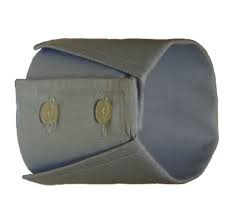cuff
英 [kʌf]
美 [kʌf]
- n. 袖口,裤子翻边;手铐;一巴掌
- vt. 给…上袖口;用巴掌打;给…带上手铐
- vi. 殴斗,拳击
- n. (Cuff)人名;(法)屈夫;(英)卡夫
使用频率:

记忆方法
1. 谐音“铐夫”
2. coup ====> cuff.
3. cap => cuff.
4. cuff coif.
2. coup ====> cuff.
3. cap => cuff.
4. cuff coif.
中文词源
cuff 袖口
词源不确定,可能同cap,帽子。
英语词源
- cuff (v.1)
- "to put a cuff on," 1690s, from cuff (n.). Related: Cuffed; cuffing.
- cuff (n.)
- "bottom of a sleeve," mid-14c., cuffe "hand covering, mitten, glove," perhaps somehow from Medieval Latin cuffia "head covering," which is of uncertain origin. Sense of "band around the sleeve" is first attested 1520s; sense of "hem of trousers" is 1911. Off the cuff "extemporaneously" is 1938 American English colloquial, suggesting an actor or speaker reading from notes jotted on his shirt sleeves rather than learned lines. Cuff links is from 1897.
- cuff (v.2)
- "hit," 1520s, of unknown origin, perhaps from Swedish kuffa "to thrust, push." Related: Cuffed; cuffing. As a noun from 1560s.
权威例句
- 1. I didn't mean any offence. It was a flippant, off-the-cuff remark.
- 我本无意冒犯,那不过是句脱口而出的冒失话。
- 2. Mr Baker was speaking off the cuff when he made those suggestions.
- 贝克先生临时提出那些建议。
- 3. He gave the dog a cuff.
- 他轻轻地拍了拍那条狗。
- 4. Superintendent Seegrave and Sergeant Cuff, representing the social control of crime, can not handle the case.
- 主管Seegrave和警官Cuff, 代表着对罪恶的社会控制, 不能处理案件.
- 5. On the contrary, with shrewdness and knowledge , Sergeant Cuff is a famous city policeman.
- 正相反, 机警又博学,警官Cuff是一个著名的城市警察.